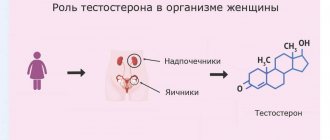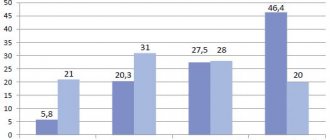This hormone is produced by the corpus luteum in the ovaries every month after ovulation and is responsible for regulating the menstrual cycle. Progesterone also helps the body prepare for pregnancy if the egg is fertilized.
After ovulation, the hormone progesterone causes the uterus to thicken and prepare to fertilize an egg. If the fertilized egg implants, it is responsible for maintaining the lining of the uterus throughout pregnancy. However, if the egg is not fertilized, the level of progesterone in the body drops, and this leads to the fact that women begin to menstruate. Progesterone is also responsible for breast growth during pregnancy. It also prevents lactation until the baby is born. Men produce a small amount of it, which contributes to the development of sperm.
The role of progesterone in the body
Progesterone is a steroid hormone that is synthesized in both female and male bodies. In women, it is secreted mainly by the corpus luteum, which is formed in each monthly cycle during the period of ovulation, that is, the maturation of the egg. Its main role is the synthesis of progesterone. In the absence of fertilization, the corpus luteum disappears and progesterone decreases. In addition, this hormone is synthesized in large quantities through the placenta.
Also, a small amount of it is synthesized by ovarian cells and the adrenal cortex. Recent studies indicate the possibility of progesterone synthesis by cells of the nervous system. The synthesis of this hormone by the corpus luteum strictly depends on the monthly cycle - the peak of secretion occurs during half of the luteal phase, while the follicular phase is characterized by low levels of progesterone. The amount of its synthesis is regulated by two other hormones secreted by the pituitary gland - LH (lutropin) and FSH (follicle-stimulating hormone).
The role of progesterone in a woman’s body is primarily to prepare the uterus for embryo implantation. Immediately after ovulation, the concentration of progesterone increases, which allows the implantation of the embryo in the event of fertilization. Progesterone promotes endometrial growth.
During pregnancy, it affects the body in the following ways:
- limits the effect of estrogens on the endometrium, which reduces the excitability of its contraction and makes it possible to report pregnancy,
- stimulates the development of mammary glands and lactation,
- supports the secretion of nutrients through the endometrium.
Progesterone also affects the functioning of the entire body, normalizing blood glucose levels, regulating thermogenesis processes and protecting the brain from neurodegenerative processes. In addition, it protects the nervous system and has a positive effect on bones and muscles.
Maintenance during pregnancy and after childbirth
During gestation, progesterone physiologically increases , starting in the first trimester of pregnancy. This is a normal phenomenon, which indicates that there are no intrauterine abnormalities.
Hyperprogesteronemia gradually increases according to the established time limits.
If in the 1st trimester progesterone levels can reach 470 nmol/l, then in the 3rd trimester the levels increase to 770 nmol/l. This is not a pathology, but the maturation of the placenta , which produces progesterone.
Low numbers are much more dangerous , especially at the beginning of pregnancy, as this can lead to miscarriage. However, extremely significant hyperprogesteronemia during pregnancy is also not the norm.
This indicates pathological changes in the placenta, which can increase the size of the uterus or cause complications for the fetus (hydatidiform mole). This condition can be corrected medicinally with drugs; for this you need to immediately consult a doctor.
No one excludes the individual characteristics of the body, since hormonal levels during pregnancy are constantly changing. It is not at all necessary that all indicators will exactly correspond to the reference values.
Progesterone norms
Progesterone levels can be determined using a simple blood test. A progesterone test in men can be done at any time; the normal range is 0.2-1.38 ng/ml. On the other hand, progesterone testing in women should be done during a specific phase of the menstrual cycle.
Progesterone - role in the body, norms and excess
Progesterone levels in women are as follows:
- follicular phase of the ovarian cycle: 0.28 – 0.72 ng/ml
- periovulatory period: 0.64 – 1.63 ng/ml
- luteal phase of the ovarian cycle: 4.71-18.0 ng/ml.
The rate of progesterone in women after menopause is slightly different - then its concentration in the blood ranges from 0.07 to 1.25 ng / ml. On the contrary, the rate of progesterone in pregnant women is constantly increasing, and at 40 weeks it can even reach more than 150 ng/ml.
Which doctor should I contact if the hormone is elevated?
Hormonal problems are traditionally dealt with by endocrinologists , who can accurately diagnose endocrine pathologies and conditions.
Regular gynecologists and gynecological endocrinologists deal with hormonal imbalances in the female reproductive system.
These are specialized specialists who can treat both reproductive and endocrine diseases at the same time.
They work in any public and private clinic, so there is no problem finding such a doctor. When hyperprogesteronemia is detected, a thorough diagnosis is carried out in order to determine the causes of this condition.
No doctor will blindly prescribe medications, because otherwise the treatment will be ineffective. The list of diagnostic procedures includes the following studies:
- analysis of venous blood for other hormones of the reproductive system (prolactin, testosterone, LH, estradiol, FSH, cortisol, ACTH, aldosterone, etc.);
- blood biochemistry;
- clinical blood test;
- general urine analysis;
- Ultrasound of the pelvic organs, kidneys, adrenal glands, abdominal cavity;
- colposcopy;
- MRI or CT examination of the pelvic organs, kidneys, adrenal glands.
The results of all examinations and procedures performed allow us to create a complete clinical picture.
It will be easier for the doctor to navigate the selection of the necessary medications and treatment methods, since each woman has her own reasons for the increase in hormonal levels.
In such a situation, an individual approach and treatment is necessary , since there are no unique drugs aimed only at eliminating the pathology.
On our website you will also find a detailed table with prolactin levels in women by age, and you will also find out what functions it performs in the body.
Do you know that an increased number of lymphocytes in a woman’s blood can signal various types of malfunctions in the body? Find out more details here: .
References[edit | edit code]
- John R. Lee, MD Hormone Balance for Men.
- Allen W. M. (1935). "The isolation of crystalline progestin." Science
- John R. Lee, MD What Your Doctor May Not Tell You About Menopause: The Breakthrough Book on Natural Progesterone.
- Johnson WS, Gravestock MB, McCarry BE (August 1971). “Acetylenic bond participation in biogenetic-like olefinic cyclizations. II. Synthesis of dl-progesterone". J. Am. Chem.
- Uzzi Reiss, MD, OB-GYN. Natural Hormone Balance for Women: Look Younger, Feel Stronger and Live Life with Exuberance.
Treatment and its features
Significant hyperprogesteronemia in non-pregnant women requires medical adjustment.
If a woman’s progesterone is higher than normal, the gynecologist individually, based on test results, selects a treatment regimen.
Initially, it all depends on how the elevated hormone manifests itself and what complications there are. If the cause is an existing disease, then the main efforts should be directed towards its treatment.
The following methods are used to reduce progesterone levels:
- drug therapy;
- surgical intervention;
- diet;
- physiotherapy.
Drugs that can lower the hormone belong to a variety of pharmacological groups. The most commonly used pills are oral contraceptives , which contain a specific combination of hormones. They suppress the action of progesterone and lower its level.
Contraceptives Yarina, Zhanin, Diane-35, Anteovin can be used as a treatment for hyperprogesteronemia. Synthetic analogues of the hormone estriol, which are no less effective in correcting the hormone, have also proven themselves well.
Epostan (progesterone inhibitor) significantly eliminates the manifestations of hyperprogesteronemia. Therefore, it is often prescribed by doctors to correct hormonal levels. In some cases, gynecologists prescribe medications such as Mifepristone, Tamoxifen, Clomiphene , etc.
All of these drugs should not be taken during pregnancy because they can cause spontaneous abortion and intrauterine complications.
Usually a woman has to treat the underlying disease that caused the increase in progesterone.
If an ovarian corpus luteum cyst has been detected, the basis of treatment will be routine diagnostic observation or anti-inflammatory therapy.
In many clinical cases, oral contraceptives are also used , which are prescribed by a doctor. In severe stages of the disease, surgical removal of the cyst or resection of the ovary is performed if there are additional pathologies.
Malignant tumors that intensely produce the hormone must be surgically removed along with the ovary. The woman is then treated with anticancer drugs and chemotherapy.
If the pathology is caused by nephrotic diseases (adrenal dysfunction, renal failure), then special medications are used that restore the function of the kidneys and adrenal glands. For adrenal pathology, corticosteroid hormones are prescribed , the dosage of which is prescribed by the doctor.
For kidney diseases, the doctor prescribes anti-inflammatory therapy. In any case, the doctor first diagnoses the patient, prescribes additional examinations and tests, and then individually selects a treatment regimen.
When is a blood test for hormones prescribed?
Hormonal analysis is usually carried out if there is a suspicion of dysfunction of the endocrine glands or if an increase in the size of the glands is detected.
Indications for testing for female sex hormones (estrogens)
are:
- menstrual irregularities;
- infertility;
- miscarriage;
- acne;
- overweight;
- fibrocystic mastopathy (breast disease).
Indications for testing for male sex hormones (androgens)
are:
- suspicion of the development of tumor processes;
- ovarian dysfunction;
- kidney dysfunction;
- overweight (obesity);
- infertility;
- acne;
- in women – excessive growth of body hair.
Hormonal analysis is prescribed during pregnancy if pathological development of the fetus is suspected. An analysis for the hormone hCG (human chorionic gonadotropin), produced by the cells of the membrane of the embryo, can detect pregnancy already on the 6-10th day after fertilization.
Diet
The clinical manifestation of the disease is sudden weight gain. Therefore, dietary nutrition plays an important role in the treatment and restoration of hormonal levels . It is necessary to strictly limit the consumption of protein foods, which slightly increase the hormone.
Protein foods include:
- cottage cheese;
- milk;
- cheese;
- beef meat;
- seeds;
- legumes;
- nuts;
- flour products;
- rice.
Eating these foods will not immediately increase progesterone levels, as they do not directly affect progesterone production. But there is an indirect effect on hormonal synthesis.
Foods rich in protein and cholesterol activate processes in the body that stimulate hormonal increases. In this case, it is advisable to consume carbohydrates (peas, potatoes, carrots, parsley, beets, onions).
Fruits and dried fruits are also beneficial for hyperprogesteronemia . They contain many vitamins and nutrients. Decoctions of red rowan, mint, and cloves are effective in restoring hormonal levels.
During pregnancy, it is not necessary to adhere to such a diet , except for the strict recommendations of a doctor who knows the clinical picture of the expectant mother.
But diet therapy is an auxiliary means of correcting the disease. This does not in any way replace the main treatment, which should play a major role in normalizing hormonal levels.
Preparing for a hormone test
The amount of hormones in the blood depends on the time of day, since there is a daily rhythm of secretion (release of hormones). Blood for hormonal analysis should be taken in the morning, on an empty stomach.
In women, hormonal levels also depend on the stage of the menstrual cycle. The most favorable days for analysis are days 5-7 of the cycle, starting from the first day of menstruation.
On the eve of the test, you should not drink alcohol, and you should also avoid increased physical activity and stressful situations. It is advisable not to smoke for an hour before the test.
A week before the test, you must stop taking hormonal medications. If you are prescribed medication, discuss this with your doctor; the test may have to be postponed.









